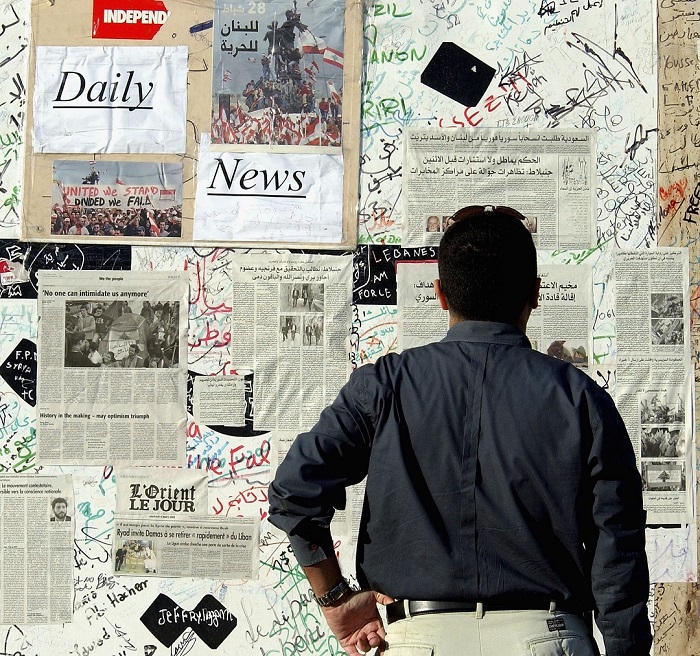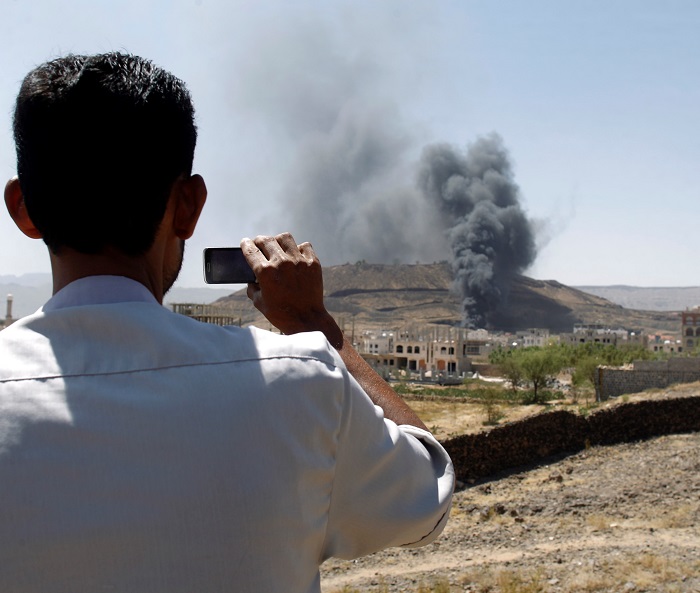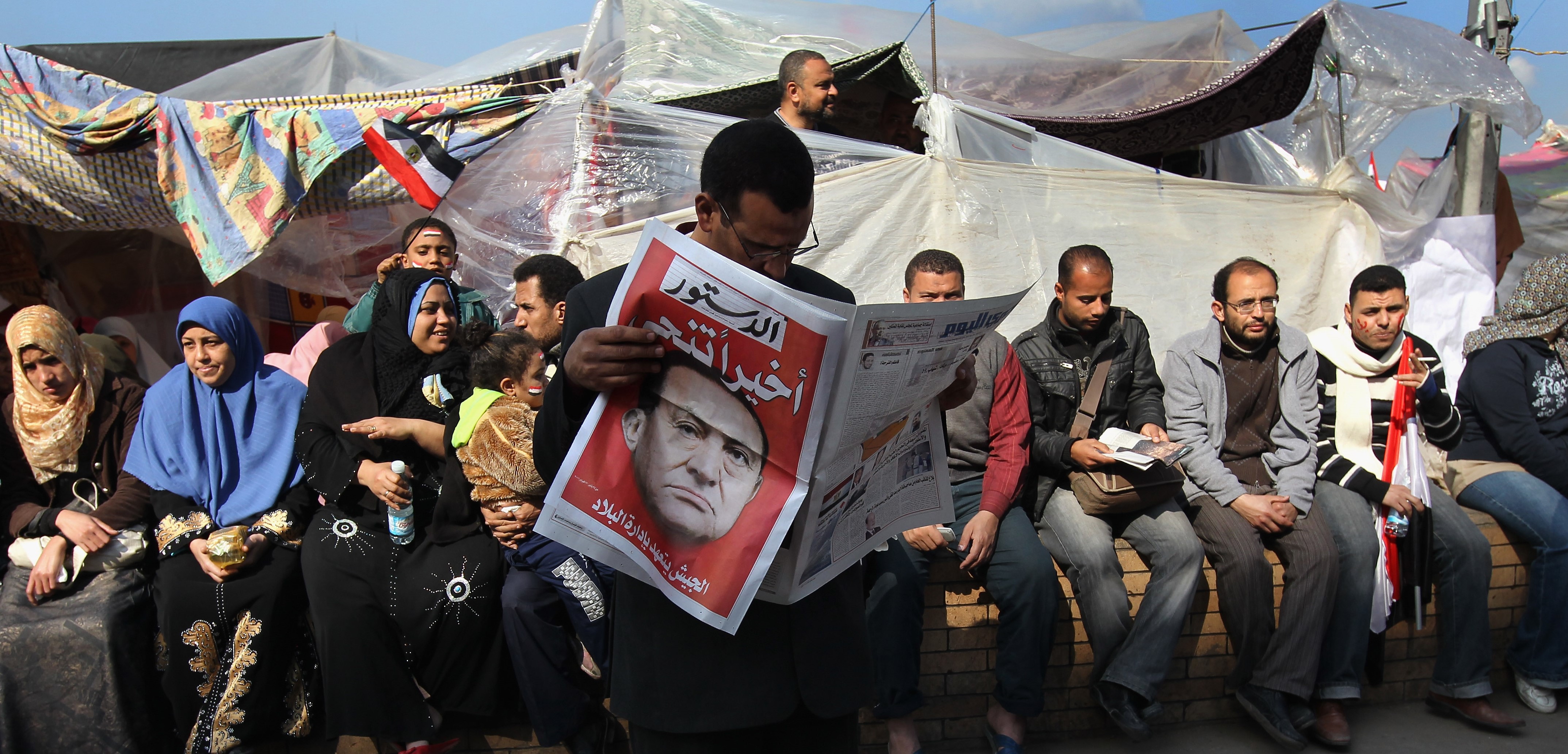إن وظيفة الإخبار كما تقترحها الأدبيات الغربيّة، تُختزل عادة في تمكين الناخب (1) (يسمى قارئاً/ مشاهداً/ متابعاً تارةً، ومستهلكاً كثيراً) من التصويت الصائب، ومن محاسبة وعقاب من صوّت له لاحقاً. كل ما يأتي بعد ذلك، لا يعدو كونه تفصيلاً أو تطويراً لهذه الوظيفة لا غير.
هذه الوظيفة كما ترسّخت هناك، تعتبر أنّ المواطن المُخبَر جيداً (2) يستطيع التصويت بما يخدم النظام المتوافق عليه (الديمقراطية الليبرالية، واقتصاد السوق الحرّ، والحتميّة التكنولوجية) ويحافظ عليه، كما يمكّنه من تتبّع مصير تصويته من باب التعبير الشهير: "ربط المسؤولية بالمحاسبة".
إن هذا الاختزال المُعمَّم الذي استُنسِخ عالمياً، ورُوِّج له باعتباره النموذج الأمثل والشكل النهائي لما يجب أن تكون عليه الصحافة الجادة، يشبه إلى حدٍّ كبير أطروحة نهاية التاريخ (3) وانتصار الديمقراطية الليبرالية بعد نهاية الحرب الباردة، إذ اعتبرت هذه الأطروحة أن النظام الليبرالي بانتصاره على "شبح" الشيوعية والاشتراكية بعد سقوط الاتحاد السوفياتي، أصبح النموذج الأوحد الذي يجب أن يُعمَّم. إن الفرضية الكامنة وراء هذا الزعم تُلغي أي اقتراح يُمكن أن يصدر عن الهوامش، أو سمّها ما شئت.

جدليّة الهوامش
الهوامش قد تكون وليدة هذا النظام بشكل من الأشكال، لكنّها تهدّد كل هذا التقليد الذي بُني على مدار سنوات، وأصبح أيديولوجية صلبة تقمع معنوياً ومادياً أي اجتهاد من خارجها. خذ كمثال على ذلك، ما سُمّي في فترة من الفترات إعلام المواطن (4) الذي استفاد بالأساس من التقنيات التي ولّدها هذا النظام، ليعبّر عن تجاوز هذه الباراديغمات المشروطة (5) والمحدّدة سلفاً، ويجبرها في الآن ذاته على إدخاله من النوافذ، بعدما أغلقت الباب في وجهه.
الهوامش هم نحن أيضاً، والقصد هنا ما يسمّى "الجنوب" و"العالم الثالث" وغيرهما، والأهم هنا المنطقة العربية بالأخص. إنّنا نتحمس مهنياً لهذا النموذج، نتعلمه ونبشر به، لكننا لا ننجح في تطبيقه بالضرورة (6)، ليس لأننا لا نريد، أو لا نستطيع ولا نملك كفاءات لذلك، بل لأننا لا نسير على نفس السكة ببساطة. يهدف المهنيون منّا إلى إخبار الناخب المُفترض، لكن لا ناخب لنا ولا انتخابات. ويسعى الكثيرون إلى إنتاج تقارير وتحقيقات استقصائية، من باب ربط المسؤولية بالمحاسبة، أو بغرض المحاسبة فقط، لكن قليلاً -وقليلاً جداً- ما يحدث ذلك، إذ لا مسؤول فعليّاً أمامنا لنحاسبه.
يردّ البعض هذا "الخلل" المهنيّ إلى عدم اهتمام "القارئ" العربي، وإلى انخفاض مستويات "الوعي"! في حين يصرّ آخرون ممّن يعتبرون أنفسهم حرفيين أكثر من غيرهم، على أن السبب كامنٌ في عدم تطبيق شروط العمل الحرفي (كما صُنعت غربياً) كما يجب: انظر مثلاً تهليل البعض لكل إنجاز صحفي غربي فقط لأنه غربي؛ تهليلٌ دائماً ما يُتبع بسؤال تهكّمي عن صحافتنا، في حين يذهب آخرون إلى أننا نتوجه نحو المُخاطَبِ الخاطئ، وأن علينا ترجمة ما ننتجه إلى لغة عالمية، إذ إن "مسؤولينا" إنّما هم مسؤولون أمام أنظمة غربية بعينها، لا أمامنا. غير أن هذه التفسيرات لا تعدو أن تكون تمويهاً إرضائياً يستخدم لغةً مستوردة، ليسكن تشخيصاً مستورداً لما يمكن اعتباره "مرضا" محلِّيا له خصوصيّته.
أصبح من السذاجة اليوم القولُ بإمكان الفصل بين السياسي والإعلامي، من باب أطروحات "الحرفة" المحضة، والموضوعية والحيادية. الإعلام مُسيّس قطعاً، وهو أداة سياسية إن أردته أن يكون "مستقلاً"، أو أداة للسياسة في باقي/ جلّ الحالات. حتّى التقليد الصحفي الغربي الذي يُقدَّم اليوم على أنّه حرفة مستقلّة لها وظائفها، لا يُنكر ذلك صراحةً؛ إذ يفخر بكونه سلطة رابعة بعد ثلاث سلطات سياسية، ويهدف إلى خدمة "الناخب" كما سلف، وهي وظيفة سياسية. كما أنّه يتجنَّد سياسياً بشكل فجّ (ليس تعبيراً سلبياً بالضرورة) أوقات الأزمات، قس على ذلك الإعلام الأميركي بعد أحداث 11 سبتمبر/أيلول 2001، وشعار صحيفة "واشنطن بوست" بعد صدمتها وبقية الإعلام "الليبرالي" من انتخاب ترمب (7): Democracy Dies in Darkness
تغيير الأجندة لا إعادة ترتيبها
إذا ما سلّمنا بهذه الحقيقة (ليس تسليماً عصيّاً ولا جديداً)، يصبح قولٌ من قبيل أنّ لنا أجنداتنا السياسية الخاصة؛ أمراً تابعاً بحكم منطق ما. كانت لنا صُحف في ستينيات وسبعينيات القرن الماضي تدّعي أن لها خصوصية محلية صرفة، غير أنها لم تكن صحفاً سياسية بالضرورة، بقدر ما كانت حزبية محدودة. كما أن طفرة التلفزيون الإخباري كانت بِشارتها المفضلة أنها توصل صوت المنطقة باستخدام أدوات الحرفة "المتوافق" عليها عالمياً، لكن هذا لم يكن سياسةً بقدر ما كان جواباً في حواريّة "الأنا" و"الآخر". لقد مارس هذا الإعلام (8) خصوصاً في الفترة التي تلت أحداث 11 سبتمبر/أيلول 2001 وحربي أفغانستان والعراق؛ نوعاً من السياسة حقّاً، لكنه تخبَّط بعدها في مرحلة "ما بعد الحرب"، وعاد وانتعش في فترة الثورات والانتفاضات العربية عام 2011، لكنه ضيَّع البوصلة أيضاً في مرحلة "ما بعد الثورات".
قبل ذلك بقليل، جاء إعلام الشبكة وإعلام المواطن والمدونات، وحمل الناس الكاميرات وانكبّوا على لوحات المفاتيح، وكانت لهم أحداث تاريخية عايشوها.. كتبوا وصوروا وناقشوا ونشروا وغرّدوا بهدف مُضمر كان يسخر من الحزبية الموجهة، ومن الحرفية المقيدة في آن. كانت فترة حيوية بحق، لها من الإيجابيات الكثير، لكن سرعان ما تبين -خصوصاً بعد صدمة الثورات المضادة- أنّ هذا الخيار لا يعدو أن يكون صراخاً غاضباً، لا يخلق سياسة بقدر ما ينفّس على الفرد.
خرجتْ عن جيل الإعلام الإخباري الأكبر، وعن جيل إعلام الشبكات الأصغر، توليفة "عقلانيّة"، بدا لها أنّها فهمت فخاخ النموذجين، وأرادت أن تُطلق نموذجاً رابعاً يأخذ من الثاني (التلفزيون الإخباري) الحرفة وشروطها وتاريخها، ويأخذ من الثالث (إعلام الشبكة) جرأته وجدّته وتقنياته. لكن وبعد تجارب لها عمر افتراضي لا يتجاوز السنوات الخمس (إذا ما افترضنا لحظة الانقلاب المصري ساعة ولادته الافتراضية)، تبيّن أن التعب السياسيّ سحب كثيراً من هذه التجارب نحو الترفيه الذي يلبس حلّة الجدّية، أو نحو خطاب الخلاص الفردي والهويات الفرعية وبقيّة الثيمات الشائعة عالمياً، وهذا التفصيل الثاني دفع كثيراً من التجارب نحو خيار الترجمة المُصاغة لما ينتج غربياً فقط. هذه المرحلة رفعت شعارات من قبيل: الصحافة السرديّة، والصحافة المتأنية، وصحافة المحتوى، أو ما أصبح متعارفاً عليه عالمياً باسم صحافة النمط الطويل، وهو نمطٌ لم يأخذ شكله الكامل بعد، وما زال بإمكانه تعبيد الطريق نحو مخرج ما، لكن من المبكر التكهن بذلك.

بحثاً عن الحل: العودة إلى السياسة؟
إن كل تطوّر حدث في التحقيب المُختزل للصحافة العربية، كان يقوم بأحد أمرين: الأول، تغيير المنصات وإدخال التقنيات، أو تغيير القوالب. والثاني إعادة ترتيب الأولويات والأجندة، أو يقوم بهما معاً. لكنّ المشكلة تكمن -ربما- في هذا الأمر الثاني. إن هذه الأجندات التي نعيد ترتيبها أمام كل أزمة، وجب أن تتغيّر برمتها إن أردنا تجاوز الأزمة فعلاً. إن تغييرها يجب أن يكون سياسياً لا مهنيّاً/حرفيّاً، ونقاش تغييرها يجب ألا يكون بين حرفيي الإعلام فقط.
نقاشات من هذا القبيل لن نجدها "هناك" كي نستوردها ونعرّبها، لأنهم أنهوا نقاشهم منذ عقود، وتقاتلوا من أجله مادياً وقانونياً وأخلاقياً، وهم يطورون هذه النقاشات اليوم (صحافة ما بعد الحقيقة). أما نحن فلا نحتاج تطويراً بقدر ما نحتاج أن نخلق نقاشاً من نقطة الصفر؛ نقاشٌ لا بدّ أن يكون هدفه العريض والأكبر: ما السياسة؟ وماذا نريد منها؟ ومن أين نبدأ؟ ومن هم الأعداء المفترضون لنقطة البداية هذه التي قد نصل إليها؟
ماذا نفعل بالإرث؟ وأين نذهب بمُمكنات الحاضر؟ الإرث هنا ما راكمناه إعلامياً خلال قرابة قرن وعقدين، ومُمكنات الحاضر تُشير إلى القواعد والقوالب الصحفيّة والتقنيات المتاحة اليوم. إن مجرّد الإجابة عن الأسئلة آخر الفقرة السابقة، ستمكّننا من مراجعة الإرث وغربلته، وهو أمرٌ لن يكون سهلاً بين أبناء المهنة، بل قد يكون معركة من معارك تكسير العظام، ستكشف عن ملامحها حالما تنطلق.
أمّا سؤال التقنيات المتاحة عالميا فقد يكون سؤالاً متجاوزاً نوعاً ما، لأنّ كل الحديث لم يكن عن الأدوات بقدر ما كان عن الغايات، على الرغم من أن بعض الأدوات مُسيسة في الأصل، وفعل الغربلة قد يطال بعضها أيضاً. خذ "صحافة البيانات" مثالاً على ذلك.. إنّها تعتمد جزئياً -كما بدأت غربياً- على البيانات أو البيانات الضخمة المتوفّرة في المصادر المفتوحة، أو في أرشيفات الحكومات، أو الوثائق التي يصل إليها الصحفيُّ الغربي عن طريق "الحق في الوصول إلى المعلومة"، بيد أن هذه البيانات إن توفّرت عربياً -وقلّما يحصل ذلك- لا تكون موثوقة بالضرورة، ولا يمكن الاعتماد عليها كليّا، وبالتالي يُصبح على الصحفي العربي عبء مضاعف: الحصول على البيانات بصعوبة، ففحصها وتنقيتها والتعديل عليها، ثم الانتقال إلى العمل التقني الصرف.
إنّ فتحات الغربال الذي سيفرضه علينا الخيار السياسيّ هي التي ستحدّد لنا ما الذي سيعبر منها، وما الذي يجب أن نتخلّص منه، وهذا حديث آخر لا بدّ له من وقفة أخرى. قبلها يجب أنّ نتذكّر شيئاً واحداً: ليس علينا أن نخجل من "وصمة" الإعلام "المسيّس"، من باب الحفاظ على الحيادية والموضوعية المزعومة. سيكون هذا اقتراحنا... اقتراح "الهوامش".
المراجع:
1- Dewenter, Ralf, Melissa Linder, and Tobias Thomas. "Can Media Drive the Coverage on Party Affiliation and Voting Intentions." April 20108. https://bit.ly/2AhKjgN
2- Ilya Somin. "Do Voters Know Enough to Make Good Decisions on Important Issues? Reply to Sean Trende." Cato Unbound. October 22, 2013. https://bit.ly/2EPeWhs
3- Fukuyama, Francis. "The end of history?." The national interest 16 (1989): 3-18. https://bit.ly/2LASrNQ
4- Bulkley, Kate. "The Rise of Citizen Journalism." The Guardian. June 10, 2012. https://bit.ly/2kHjLid
5- Johnson, Kirsten A., and Burton St John III. "Citizen Journalists' Views on Traditional Notions of Journalism, Story Sourcing, And Relationship Building: The persistence of legacy norms in an emerging news environment." Journalism Studies 18, no. 3 (2017): 341-357.
6- Doyle, Chris. "The Press and the Arab Spring: Six Reasons for Failure." June 6, 2011. https://bit.ly/2GGGxDc.
7- Farhi, Paul. "The Washington Post's New Slogan Turns out to Be an Old Saying." The Washington Post. February 24, 2017. https://wapo.st/2VbLneF.








































